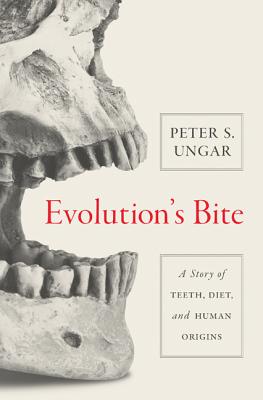

 Princeton University Press
Princeton University Press
Evolution's Bite: A Story of Teeth, Diet, and Human Origins


Key Metrics
- Peter Ungar
- Princeton University Press
- Hardcover
- 9780691160535
- 9.4 X 6.2 X 1.1 inches
- 1.2 pounds
- Science > Life Sciences - Evolution
- English
 Secure Transaction
Secure TransactionBook Description
What teeth can teach us about the evolution of the human species
Whether we realize it or not, we carry in our mouths the legacy of our evolution. Our teeth are like living fossils that can be studied and compared to those of our ancestors to teach us how we became human. In Evolution's Bite, noted paleoanthropologist Peter Ungar brings together for the first time cutting-edge advances in understanding human evolution and climate change with new approaches to uncovering dietary clues from fossil teeth to present a remarkable investigation into the ways that teeth--their shape, chemistry, and wear--reveal how we came to be.
Ungar describes how a tooth's foodprints--distinctive patterns of microscopic wear and tear--provide telltale details about what an animal actually ate in the past. These clues, combined with groundbreaking research in paleoclimatology, demonstrate how a changing climate altered the food options available to our ancestors, what Ungar calls the biospheric buffet. When diets change, species change, and Ungar traces how diet and an unpredictable climate determined who among our ancestors was winnowed out and who survived, as well as why we transitioned from the role of forager to farmer. By sifting through the evidence--and the scars on our teeth--Ungar makes the important case for what might or might not be the most natural diet for humans.
Traveling the four corners of the globe and combining scientific breakthroughs with vivid narrative, Evolution's Bite presents a unique dental perspective on our astonishing human development.
Author Bio
Peter Ungar serves as Distinguished Professor of Anthropology and Director of the Environmental Dynamics PhD Program at the University of Arkansas. He received his PhD in Anthropological Sciences from Stony Brook University and taught Gross Anatomy in the medical schools at Johns Hopkins and Duke before joining the University of Arkansas faculty in 1995.
He is an Honorary Professorial Research Fellow of the Evolutionary Studies Institute at the University of the Witwatersrand in Johannesburg, South Africa, and has served as visiting faculty at Flinders University in Adelaide, Australia, the University of Helsinki in Finland, and Southwest Jiaotong University in Chengdu, China.
Research Interests
Ungar is known primarily for his work reconstructing diet and environments from fossil teeth. He has spent thousands of hours observing wild apes and other primates in the forests of Latin America and Indonesia, studied fossils from tyrannosaurids to Neandertals, and developed new techniques for using surface analysis technologies to tease information about ecology and evolution from tooth shape and patterns of use wear. He has also conducted research on oral health of the Hadza peoples of Tanzania, the last remaining hunter-gatherers in Africa.
His current work focuses on using tools developed for analyzing fossil teeth to 1) study impacts of climate change on the ecology of Arctic mammals and 2) document and monitor dental pathologies in a clinical setting.
Education
- B.A., Anthropology, State University of New York at Binghamton
- M.A. and Ph.D., Anthropological Sciences, State University of New York at Stony Brook
Source: University of Arkansas
Videos






Community reviews
Write a ReviewNo Community reviews